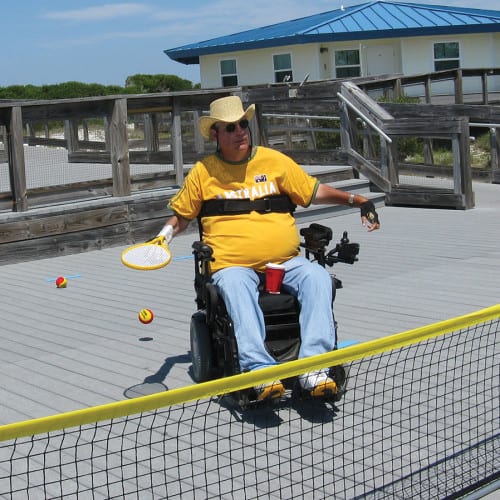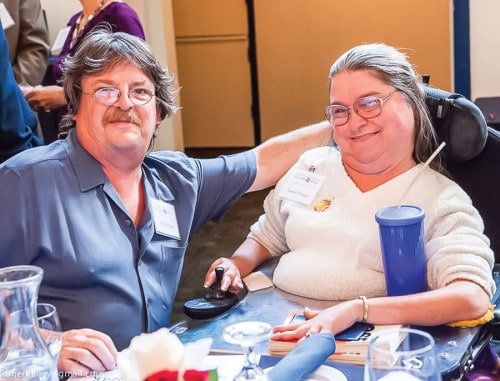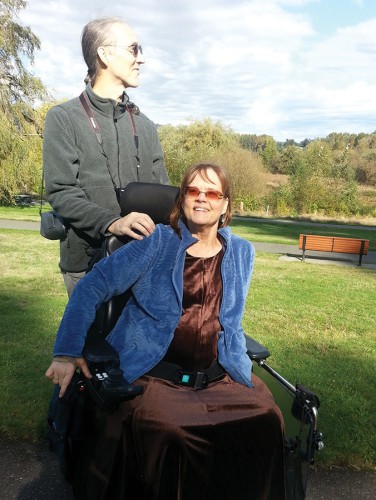For quality attendant care, first you have to assess how many hours a day you require personal assistance, and then you have to come up with a way to pay for it. Next you need to find people willing to work for you, and it helps if they’re not criminals. Once you’ve got all of that squared away, you still have to manage them. Does this sound impossible? It isn’t. Following are the experiences of people who use personal assistance, and use it well.
Issues surrounding personal assistance services are some of the most complicated and expensive results of being paralyzed. Without someone to assist with activities of daily life such as getting in and out of bed, using the bathroom, bathing, getting dressed, cooking, helping with eating, laundry and maintaining household cleanliness, many people with disabilities would be trapped in their beds and prone to even more medical complications than are already present.
People who hire care staff to visit their homes compete with home health agencies and institutions that use similarly qualified individuals, and often provide benefits to their employees. Therefore it is important for individuals to be innovative in seeking homecare support. Fortunately, unlike institutional employers, individuals can recruit non-medical personnel like family members, friends and neighbors to perform the duties they need to remain healthy and independent.
For many people with disabilities, their first experience with personal assistance is Mom and Dad. Laurie Hoirup is an author who lives in Sacramento, Calif., and has been dealing with caregivers for over 50 years. “I was diagnosed with spinal muscular atrophy at 18 months,” she says, “and have required full personal care, other than feeding, for most of my life. My parents provided my care until I left for college when I was 17.”
For others, the switch to help from outside the family happens at a younger age. Barb Barrett was the primary caregiver for her son, Sean, who was born with juvenile arthritis. The single mom, now living in Arlington, Wash., had no outside assistance, and eventually had to reach out for more help. “There came a time when Sean became too heavy for me to lift safely, and he had also reached an age where it was no longer appropriate to have his mother giving him baths,” Barrett shared. “So I located a young man who was willing to take on the task as part of his college studies leading to a career in the field of medicine.”
Giving up the maternal caregiver role did not come easily, as Barrett revealed she stayed in her bedroom the first morning that student showed up for work. It all worked out, though. “I heard laughter, from both of them, coming from the bathroom as they were going through their routine,” she says, “and I knew at that moment that everything was going to be all right.”
Setting — and Funding — a Schedule
A person being released from a hospital to return home, or a parent whose child has simply grown too large or too old for continued parental caregiving, will enter into a realm where there are multiple issues to be considered as decisions about homecare are made. The search for assistance can become a little easier with forethought and plenty of preparation.
In the early stages of being set up in the home, it is a good idea to consider whether hours of care might be reduced while still meeting the needs of the person requiring assistance. Hospitals, nursing homes and other types of institutional settings have qualified personnel on duty around the clock. If there is little or no care needed during nighttime hours, or even at certain times during the day, perhaps that can be figured into potential work schedules for attendant care providers once the person transitions into their own home.
Seeking out all available sources of funding for caregivers is important. Leaving an institution and returning home usually means responsibility for paying costs of nursing or personal care will shift to the individual and away from medical insurance companies. An exception would be in those states that have a Medicaid home and community-based services waiver to pay for homecare. Eligibility for waiver services is usually determined by whether the person needing the care would be eligible for placement in a nursing home or other type of institution, as well as having limited income. Unfortunately, there are still several states that have not applied for a Medicaid waiver to fund such home-based services.
Jesse Collens qualifies for Medicaid homecare. “As a young man in Alaska,” he remembers, “I was living the good life until the day that, just hanging out with a friend after work, I decided to attempt a front flip off a statue while riding my bicycle.” The crash and resulting C1 quadriplegia brought the stunt to a quick end. Now he requires assistance around the clock. During the six years since his accident, Collens, who uses a vent, has moved to Washington State and is receiving the assistance of a combination of private duty nurses and non-nursing caregivers. He continues to appeal to the state Medicaid agency for 24-hour coverage but is still a couple of hours short of reaching that goal.
Depending on the status of the person needing help, there may be other resources available for caregiver funding. State vocational rehabilitation agencies are funded by the Rehabilitation Act for the purpose of assisting qualified people with disabilities in obtaining an education and finding employment. Voc rehab agencies covered some of the personal care attendant expenses during college for Laurie Hoirup, Sean Barrett and Dennis Rawlins, a C5 quad from Arlington Heights, Ill.
Local Centers for Independent Living are also a great resource. Operated by people with disabilities with funding and authority granted through the Rehabilitation Act, CILs offer information and referral, systems advocacy, individual advocacy, independent living skills training, peer support, and sometimes services related to homecare.
Securing Attendants
When it comes to recruiting personal assistants, Mia Arends, a C5 quad from Kirkland, Wash., has found that newspaper classified ads are not as effective as they once were. She posts her ads on Craigslist and other websites frequented by job seekers, like care.com and mycnajobs.com. “I have also posted notices on local college bulletin boards, especially those that have nursing or nursing assistant education programs, with limited success,” she says. Most individuals interviewed for this article used similar strategies, but often the most effective approach was word-of-mouth.
Arends believes it is important to have a clear understanding of duties prior to a caregiver beginning work. She lists as many details about the position as possible, and requests experience, references and appropriate certification. Once a candidate shows up for an interview, she provides full information about the duties and probable hours of work for each day, and provides a separate list that explains in detail how she expects the range of motion exercises to be done.
Even if a caregiver candidate is located, problems can still occur. “I got a call this afternoon from a nurse I was hiring,” says Collens. “We were just waiting on his background check to come through so he could start, but he got another job offer and took it. This is the third time this has happened to me. My mom is working more than 48 hours a week. She is not getting paid and she is exhausted.”
Avoiding the above hassle by hiring a homecare agency has its own challenges. “I am in the throes of looking for a caregiver,” says Arends. “But it’s not going very well. I feel we offer fair wages plus paid holidays, vacation and sick days. As a backup, I met with the managers of an agency to set up a deal with them in case we don’t find someone, and I’m not finding anyone. I paid them a month’s fee and they provided me with a list of people to contact. However, I don’t seem to get anyone following through.” The agency referred Arends to care.com and carelink.org, paid services that also did not meet expectations.
As Arends has discovered, many businesses that describe themselves as caregiving, senior care or homecare agencies do not actually provide the employees to do the work. Instead, they recruit a variety of individuals seeking caregiving positions and add their names and phone numbers to a list which they then sell to those who are seeking care. They often take no responsibility for the many aspects of hiring, including background checks.
Some agencies that do hire caregivers charge customers about twice the rate than the employees are being paid. David N., a quad from a small rural community who requested to remain anonymous, has faced many challenges when seeking to hire someone capable of taking care of his needs on a regular basis. In desperation, he turned to local homecare agencies for assistance. “My previous and current caregivers are from agencies,” says David. “But the problem with this area is there are only two agencies that will service this small town and one agency only has limited service — one caregiver four days per week.”
All of his caregivers have been “private pay,” with no coverage by Medicaid or any insurance provider. “My first caregivers were paid $12.50 per hour cash, since I recruited them myself,” says David. “But the agency rate that I am forced to pay now is about $24 per hour and the caregiver is paid only half that.” To make matters worse, David pointed out that none of the agency caregivers have been capable of transferring him so he could be out of bed during the day.
Don’t Skip the Background Check
In the rush to find help, background checks are often skipped, but that can be risky. Dolores Carron, a quad from Connecticut, has had a succession of good assistants. According to Carron, “I have been fortunate that anyone who has left me has always made sure they find me a good replacement.” While that has worked well for Carron, it is important to learn as much as possible about individuals who will be spending hours at a time in your home.
There continue to be too many instances where caregivers, both strangers and family members, have abused, assaulted or stolen from those they were hired to assist. The federal Bureau of Justice Statistics found that, in 2009, there were 5 million vulnerable adults, 2 million elders and 1 million children reported as being abused. Background checks can minimize the risk of that happening, but they are no guarantee of safety.
Dennis Rawlins learned the hard way that those entrusted to care for us are not always worthy of our trust. “There was a time I needed help at home and contacted an agency for someone to help. It was only for a week or two and I had no choice in who the person was that they assigned,” says Rawlins. “The man they sent seemed all right until the day when he asked if I had some money that he could borrow for gas. I was in the process of telling him I didn’t think I had any money when he reached into my backpack and took $10 or $20 from my wallet. I was shocked, but he promised he would pay me back.” The following week, when that caregiver wasn’t returning calls, Rawlins called the agency and explained the situation to the woman on the phone, who apologized, saying that caregiver had done the same thing to other people.
An Internet search for “background checks” will result in several pages listing information about how to accomplish them, and ads from many private companies offering to do it for a fee. Law enforcement agencies also perform background checks for a reasonable cost. “I have it done through local law enforcement, and that gets you information about misdemeanors and felonies,” says J.R. Harding, a C5 quad. “But it’s limited to the state of Florida. If you want a national search, that costs too much.”
Larry Littleton, who lives on the Hawaiian island of Kauai, had the responsibility of finding caregivers for his aging parents. Both of Littleton’s parents were living in the Los Angeles County area when he attempted to find a live-in caregiver for them because his mother had dementia. A friend of Littleton’s worked for a private investigator and ran background checks for him on 70 individuals who had applied to live with them. “All of those failed a very basic background check,” said Littleton. “So, as a result of my inability to locate a trustworthy individual to care for my parents, I moved them to Kauai to live out their days.”
Managing Caregivers — and Your Stress
Collens has learned that managing caregivers is not always easy. In a recent blog post, he wrote: “All of this staffing that I’m learning to manage is extremely stressful. I’ve definitely been learning to handle my stress a lot better in the past few months, but this is driving me crazy.”

That type of stress can also impact family members who serve as caregivers, says Littleton. “Hospice or respite services are a blessing, but we often do not ask for their services soon enough. It is important to find that balance between caring for your loved one and caring for yourself. Don’t hesitate when you begin to burn out.”
Managing caregivers takes as much time and skill as are needed to run a business. Even with clear expectations and a statement of duties, Hoirup advises that one of the big problems is that, over time, personal care attendants can lose sight of the fact that they are employees — they sometimes feel like the boss. “Too often, when they do so many things for you, they tend to become parent-like and want to do things their way,” she says. “And it is best to nip this in the bud. I think it’s important to always stay involved in whatever activity you are having the caregiver do. It’s also helpful to hold monthly meetings just to communicate and prevent problems from arising.”
What about when things do go wrong? Hoirup shared that there have been various reasons for dismissing caregivers, such as showing up late, personality differences, etc. Other individuals also mentioned theft and abuse, even verbal abuse, as potential reasons for dismissal. “I have usually handled the situation tactfully to keep things peaceful and not ‘end ugly,’” says Hoirup. “Thankfully, I am married and my husband is my backup system.” The advice from Harding is similar, as he stressed that orderly transition is critical, since each dismissal brings with it increased costs for training, changing locks and background checks, as well as heightened vulnerability.
Can the current system work better? Dan Thompson is a Certified Life Care Planner from Huntsville, Ontario. He is also a quad and feels there are lessons to be learned from how Canada’s provinces treat people with disabilities. As an example, the Ontario Disability Support Program provides living expenses, healthcare and other supports while still enabling people with disabilities to obtain employment. He noted the Medicaid homecare program appears to be very heavy on bureaucracy, especially at the state level. In contrast, most of Ontario’s programs strive to put more control in the hands of the consumer.
Another person involved in homecare at the professional level is Annette Jeske, who works for an Area Agency on Aging in Michigan. “The Medicaid waiver is for people who would be eligible for nursing homes,” she says. “But sometimes companies supplying the direct care workers have their own profit interests at heart versus meeting the needs of those they serve.” She cites the requirement for mandatory training for caregivers. No funding is available at the present time to offer the day-long program to care staff. “Additionally we often hear that the average wage here is $9.05 per hour for care staff, yet anecdotal evidence indicates many make only $8.15 per hour, even with a CNA license. Local fast food restaurants are offering $15 per hour.”
Jeske is passionate about this issue and hopeful it can be changed for the better. “The grassroots, especially young people, can change this in time,” she says. “But we need to develop a talent pipeline for caregiving as a great profession, starting young.” For the sake of everyone needing care, it would be nice if that pipeline was in existence today.
Resources:
• Centers for Independent Living — ilru.org
• Family Caregiver Alliance — caregiver.org/caregiving
• Medicaid Waivers — medicaid.gov
• Ontario Disability Support Program — www.mcss.gov.on.ca/en/mcss/programs/social/odsp/
A Sample Personal Care Assistant Schedule
By Mia Arends
• Start with range-of-motion exercises in bed
• Transfer to shower chair for bowel program
• Assist with shower
• Make beds and sweep
• Remove trash from bedroom and bathroom as needed
• Transfer back to bed and assist with dressing
• Finish dressing, including support stockings
• Move wheelchair to bed and transfer from bed to chair
• Prepare and setup breakfast
• Occasionally assist with bladder function
• Prepare meal for later consumption
• Drive van and assist with medical appointments, shopping and other errands
• Assist with swim therapy (PCA does not enter the water)
• Light housekeeping – cleaning and laundry
Support New MobilityWait! Before you wander off to other parts of the internet, please consider supporting New Mobility. For more than three decades, New Mobility has published groundbreaking content for active wheelchair users. We share practical advice from wheelchair users across the country, review life-changing technology and demand equity in healthcare, travel and all facets of life. But none of this is cheap, easy or profitable. Your support helps us give wheelchair users the resources to build a fulfilling life. |






Recent Comments
Bill on LapStacker Relaunches Wheelchair Carrying System
Phillip Gossett on Functional Fitness: How To Make Your Transfers Easier
Kevin Hoy on TiLite Releases Its First Carbon Fiber Wheelchair